
Scientists at the D.K. Zabolotny Institute of Microbiology and Virology of the National Academy of Sciences of Ukraine are creating probiotic preparations for fermenting vegetables. The D.K. Zabolotny Institute of Microbiology and Virology of the National Academy of Sciences of Ukraine is developing probiotic preparations for fermenting vegetables based on strains of the lactic acid bacterium Lactobacillus plantarum, the website of the National Academy of Sciences of Ukraine reported on Tuesday.
At the forum “Innovative Approaches to Industrial and Craft Production: Challenges and Opportunities,” the Institute’s scientists presented fermented beverages based on vegetable juices. Vegetable juices are a source of vitamins and many other nutrients. Fermentation with the lactic acid bacteria Lactobacillus plantarum not only extends the shelf life, but also enriches vegetable juice with biologically active metabolites, reduces carbohydrate content and gives the juice functional properties.
Scientists at the Department of Industrial Microorganism Physiology have produced a beetroot drink – beetroot juice fermented with selected strains of lactic acid bacteria. It is sweet and sour in taste (with a faint beet flavor), contains less carbohydrates and more of certain amino acids, as well as lactic and other organic acids, vitamins B, PP, C, E, minerals, betanin and pectin.
Long-term studies of the biological activity of beetroot juice and clinical trials on volunteers have shown that drinking 50 ml of beetroot juice for two weeks had a positive effect on overall health, improving the functioning of the digestive tract and circulatory system. A positive effect after drinking the juice is observed in dysbiosis, gastritis, hypertension, myocardial dystrophy, hypovitaminosis C and B in wartime and postwar. Today, the Institute’s scientists continue to work on this product: they have improved the composition of the bacterial starter and are studying its biological activity in depth.
fermenting, microbiologists, probiotic preparations, VEGETABLES
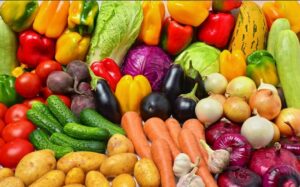
Ukrainian agrarians in 2023 grew 1.45 million tons of vegetable crops, harvested from 88.4 thousand hectares (23.2% of the total sown areas) with an average yield of 163.9 c/ha, the press service of the Ministry of Agrarian Policy and Food of Ukraine reported.
According to the report, in general, Ukraine has grown: 105.4 thousand tons of cabbage, 310.3 thousand tons of cucumbers, 175 thousand tons of tomatoes, 428 thousand tons of onions, 51.7 thousand tons of carrots, 35.3 thousand tons of table beets and 344.3 thousand tons of other vegetables.
According to the Ministry, as of August 9, Ukraine harvested more than half of cucumbers – 51.4%. Agrarians in Vinnytsia and Ivano-Frankivsk have fully completed their harvesting.
A similar situation with onion harvest, which was collected on 51.4% of the area. It has been finished in Ivano-Frankivsk and Kharkiv regions and almost finished in Kherson region.
Potatoes were harvested 711.5 thousand tons with an average yield of 13.9 tons per hectare. The highest yield of potatoes in farms in Khmelnytskyi region – 29 tons per hectare, stated the Ministry of Agrarian Policy.
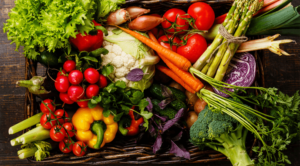
Ukraine imported “borscht set” vegetables, in particular potatoes, carrots, beets, cabbage and onions, worth $100.253 million in January-June 2023.
According to statistics released by the State Customs Service (SCS) on Monday, Ukraine imported 12.476 thousand tons of potatoes worth $8.641 million in the first six months of 2023.
At the same time, 27.29% of the market share of imported potatoes in the first half of this year belonged to Greece, which was able to earn $2.23 million from its sales. Potato shipments from Romania accounted for 12.66% worth $1.034 million, and from Azerbaijan – 9.67% and $970 thousand, respectively.
Ukraine had to import the entire “borscht set” during the most deficient in terms of vegetables in the first half of 2023. In particular, purchases of onions on foreign markets reached 0.16% of the country’s total imports, cabbage – 0.09%, carrots and beets – 0.06%. In total, market operators spent $93.882 mln to purchase these basic vegetables in the diet of Ukrainians (excluding potatoes).
The top three leading suppliers of “borscht set” vegetables in the group were importers from Poland and the Netherlands. They accounted for 43.5% and 31.6% of Ukraine’s onion imports, which amounted to $12.393 mln and $8.949 mln, respectively. The leading onion supplier was China with 8.3% of supplies worth $2.346 mln.
The leader in cabbage supplies to Ukraine was Poland, whose share in supplies amounted to 32% and brought $9.147 million to the neighboring country. Macedonia ranked second with 31.6%, for which it earned $9.034 million, while the Netherlands ranked third with 10.8% and $3.093 million, respectively.
Poland also turned out to be one of the leading suppliers of root vegetables – carrots, beets and celery – in the first half of 2023. The share of imports of these vegetables in the domestic market reached 46.9%, which in monetary terms amounted to $11.072 million. The best in supplies of these vegetables were the Netherlands and Turkey, whose supplies occupied 37.7% and 2.9% of the import share, which in monetary terms amounted to $8.899 million and $683 thousand, respectively.
The most demanded vegetables in winter-spring time in Ukraine are tomatoes and cucumbers. Import of tomatoes in the first half of 2023 amounted to 0.29% of all imports into the country, cucumbers – 0.07%, which amounted to 73.05 thousand tons and 28.182 thousand tons respectively.
The leader in supplying these vegetables to Ukraine was Turkey, which accounted for 77.4% of all imports of tomatoes and 46.8% of cucumbers in January-June 2023, which amounted to $45.5 million and $12.87 million, respectively.
The top three suppliers of tomatoes to Ukraine were Poland, which accounted for 20.37% of supplies worth $12.989 mln, and the Netherlands with 2.99% of supplies worth $1.9 mln.
In addition to Turkey, Ukraine bought cucumbers in the first half of 2023 from Romania, which fulfilled 35.33% of supplies worth $9.714 million, and Poland with 11.3% for $3.106 million, respectively.
Despite the shortage of vegetables in the country, Ukrainian agricultural producers managed to send small batches of them for export.
Ukrainian potatoes are forbidden to be supplied to the European market due to legislation not adapted to European requirements. Ukraine did not lose its traditional markets and managed to earn $11.251 million on the export of 19.854 thousand tons of potatoes, of which 50.7% went to Bulgaria, 39.7% to Azerbaijan, 9.05% to Moldova.
Cabbage exports from Ukraine amounted to 871 tons, of which 98% went to Bulgaria. Deliveries of onions, carrots and beets to foreign markets were practically not performed in the first half of 2023.
The sale of 781 tons of cucumbers on foreign markets brought Ukraine $1.905 million. The traditional buyer of greenhouse cucumbers is Poland, where in the first half of 2023 was made 96% of all exports of this vegetable, and the Baltic States, in particular, in Lithuania went 3% of Ukraine’s exported cucumbers.
Ukrainian farmers earned $463 thousand on export of 120 tons of greenhouse tomatoes, 86.5% of which were bought by Poland and 12.4% by Estonia.
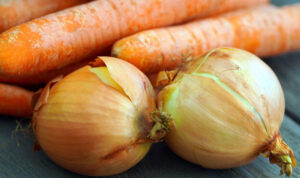
Ukrainian agrarians in 2023 plan to increase sown areas under onions, carrots and other vegetables, which will allow for a larger than in 2022 harvest, First Deputy Minister of Agrarian Policy and Food Taras Vysotsky said.
“The Ministry of Agricultural Policy and Food is working to fill the market and stabilize prices. This should be done not through regulation or limitation but through market mechanisms. Because regulation of prices, as practice shows, is realized in the shadow turnover,” – said the official on the air of the marathon “Unified News”.
Speaking about the current prices of vegetables, Vysotsky said that the prices of vegetables are the highest in spring, which is explained by the seasonal factor.
In addition, according to him, their cost was affected by two other factors. “First, the energy crisis created by the aggressor country prevented a large part of the harvest from being saved. Second, many vegetables, primarily onions and carrots, were grown in the Kherson and Zaporozhye regions. Because of the occupation of these regions, vegetables were not available to Ukrainian consumers,” Vysotsky said and expressed confidence that prices would go down with the arrival of the new crop.
According to Gosstat, prices for vegetables in Ukraine for the year to the beginning of March rose by 36.2%, fruit – by 74.9%, while inflation was 24.9%.
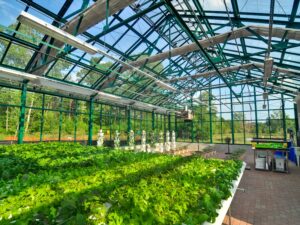
Production of potato in Ukraine in the first half of 2021 decreased by 19.8% compared to the first half of 2020, to 240,800 tonnes, and of vegetables – by 4.8%, to 684,700 tonnes, according to the website of the State Statistics Service.
The State Statistics Service said that as of July 1, potatoes were harvested from a total area of 17,900 hectares, which is 22.2% less than on July 1, 2020. The average potato yield increased by 9.7%, to 141.8 centners per hectare. The leaders in potato production were Kherson region, which harvested 79,800 tonnes (less by 36.1% compared to January-June 2020), Zhytomyr region – 46,500 tonnes (less by 0.8%) and Vinnytsia region – 39,800 tonnes (less by 2.9%).
In addition, it is reported that the total production of vegetables in Ukraine in the first half of 2021 decreased by 4.8% compared to the first half of 2020, to 684,700 tonnes. At the same time, production of open field vegetables remained at the level of January-June 2020 – 386,900 tonnes.
The yield of open field vegetables in the first half of the year increased by 4.6%, to 183.6 centners per hectare. As of July 1, 2021, crop data were collected from 21,900 hectares, which is 1.4 less than on July 1, 2020. The leaders in the cultivation of open field vegetables during this period were Kherson region, which harvested 234,500 tonnes of this crop (an increase of 2.3 times compared to January-June 2020), Lviv region – 312,400 tonnes (more by 24.8%) and Dnipropetrovsk region – 19,500 tonnes (more by 58.9%).
According to the State Statistics Service, the production of fruit and berries in January-June 2021 decreased by 7.2% compared to January-June 2020, to 182,100 tonnes. The leaders in their cultivation were Dnipropetrovsk region, which harvested 21,400 tonnes of fruit and berries (less by 6.1% versus January-June 2020), Donetsk region – 21,100 tonnes (more by 54.3%) and Zaporizhia region – 17,500 tonnes (more by 86.8%).
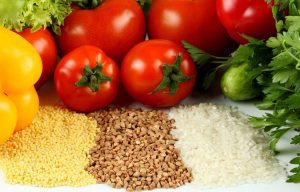
The Cabinet of Ministers proposes to the Verkhovna Rada to adopt the bill “On Amending the Customs Tariff of Ukraine regarding the temporary application of import duty rates on certain types of grain crops.”
Relevant bill No. 3310 was registered in parliament on April 7, 2020.
The text of the bill is not yet available on the Rada’s website. However, an informed source on the market, explained in a comment to Interfax-Ukraine that it was about canceling duties on the import of vegetables and cereals before July 1.